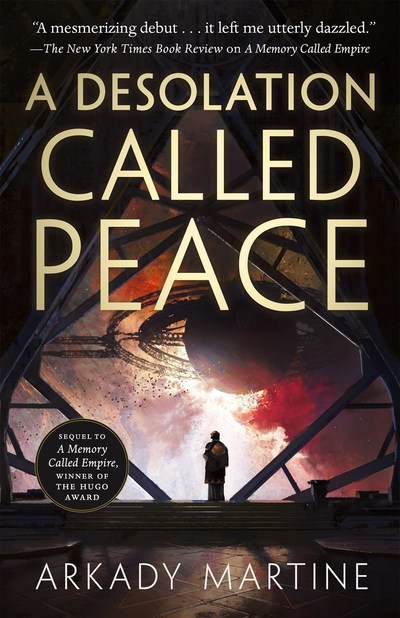Dex is a monk of Allalae, the god of small comforts, living in the only city on the planet of Panga. Their city and its satellite villages are the only parts of their world where humans have lived since the Factory Age, which ended when human-built robots suddenly achieved consciousness and asked to be given the freedom to choose their own path through existence. The robots vanished into the wilderness, and the humans have lived in their cities alone ever since.
After Sibling Dex begins ruminating on a recording of evening crickets—a sound that they have never heard in reality, as generations ago, crickets were rendered extinct in areas inhabited by humans—they start to see all the other ways they feel unfulfilled. They decide to become a tea monk, a vocation devoted to helping people in the satellite villages through a combination of good listening and good tea. But after years tending to the villages, Dex’s cricketsong wanderlust remains unfulfilled, and they leave the trails between human habitations behind, striking off into the foreign forests.
Typically, we assume that stories require conflict, and this is particularly true in genre fiction, in which there are worlds to be saved, aliens and elves to be romanced and new technologies and ancient incantations to be discovered. So it is striking that Becky Chambers’ novella A Psalm for the Wild-Built is narratively compelling without anything approximating a typical science fiction conflict. Rather, it is a story of discovery, fueled by the tension of exploring a small slice of an unknown world, like a more tightly constructed Zen and the Art of Motorcycle Maintenance.
In keeping with the rest of Chambers’ work, Psalm is a remarkably personal story set within a much larger saga; in this instance, she sets Sibling Dex’s journey across Panga against a canvas of rapid, large-scale sociocultural evolution. And although Psalm is separate from Chambers’ Wayfarers series, it follows many of the same themes: the strength of platonic bonds, thoughtful engagement with one’s environment and personal growth. It also retains the fundamental hopefulness and aspirational nature of her longer works.
A Psalm for the Wild-Built is the perfect length. If it were shorter, it would be unsatisfying. But if it were longer, its meditative tenor might have become unsustainable, even with Chambers’ sense of whimsy shining through as frequently and naturally as it does. Introspection and humor are perfectly balanced, to the point that these two tones literally bracket the novella: The first line is a shot of humor that admirably sets the mood and grabs the reader’s attention, while the last line is a draught of peaceful gratification reminiscent of one of Dex’s prized brews. This duality is characteristic of Chambers’ work, and A Psalm for the Wild-Built admirably demonstrates how it can translate beautifully into shorter formats.
Psalm also highlights Chambers’ talent for world-building without excessive description. The ubiquity of ox-bikes, which are bicycles aided by electric motors to handle towing loads and climbing hills, speaks more clearly to Panga’s wholesale commitment to sustainable technology than pages of exposition. Similarly, the nature of this world’s six gods—including their separation into Parent Gods representing natural forces (Bosh, the god of the life cycle; Grylom, the god of the inanimate; and Trikilli of the framework of natural laws) and Child Gods representing human creation or action (Allalae of small comforts; Chal, the god of constructs; and Samafar, the god of mysteries)—paints a remarkably detailed picture of the cultural ethos of Panga society. And the tea monks, journeying through satellite villages, providing solace with a kind ear and a warm mug of tea, highlight this culture’s deeply collectivist bent.
A Psalm for the Wild-Built is a worthy addition to Becky Chambers’ already burgeoning oeuvre. It distills her established interest in moving the grand conflicts of genre fiction to the background, in favor of more inspiring personal stories infused with beauty and optimism.


























